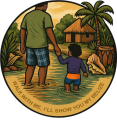Why Belize’s Wildlife Needs More Respect—and More Questions
When people imagine Belize, they often picture postcard beaches or ancient Maya temples. But for me—and for many who live here—one of our country’s greatest treasures is less talked about: the astonishing diversity of wildlife that still survives in our forests, rivers, and reefs.
Over the years as a guide—and as a certified Wildlife Ambassador—I’ve seen more travelers come eager to experience that nature up close. Sometimes, though, I wonder if we’ve all stopped asking hard questions about what “respect” really means.
A Fragile Abundance
Belize is home to hundreds of bird species, rare mammals like jaguars and tapirs, and countless marine creatures. Our barrier reef is a haven for sea turtles, nurse sharks, and rays. Even after decades working in tourism, I still feel awe when I watch a manatee surface or glimpse a scarlet macaw in the canopy.
But abundance can create an illusion of permanence. Just because something feels common—like nurse sharks near Caye Caulker or Placencia—doesn’t mean it will always be here, or that our practices aren’t changing it in ways we don’t fully understand.
Interactions Without Study
In some areas, tourism depends on wildlife encounters. People come specifically to feed nurse sharks or swim with them. I understand why—these moments can be unforgettable. But I also think it’s worth asking: What happens to an animal’s behavior after thousands of these interactions?
Over time, does it create a kind of “domesticated” wild shark? Are we changing their instincts without realizing it? The truth is, we don’t have enough long-term studies to know. And when it comes to something as complex as an ecosystem, ignorance can have consequences we can’t undo later.
Manatees and Vanishing Seagrass
Further south, manatees have fewer and fewer safe areas to graze. Seagrass beds are destroyed to make room for tourism development. Every time a dock expands or dredging reshapes the bottom, it chips away at the habitats these gentle animals depend on.
Yes, visitors can be careless—getting too close or speeding through shallow areas. But sometimes the damage comes from our own local choices. We need more awareness, better planning, and clearer rules that protect manatees as much as we enjoy watching them.
Responsible timing matters. Use our migration calendar to plan ethical sightings around protected areas and nesting seasons.
The Highways We Share
Respect isn’t only about the water. Every year, animals die crossing Belize’s highways—tapirs, iguanas, snakes, and countless birds. Sometimes it’s unavoidable, but sometimes it happens because we rush, drive distracted, or treat wildlife like an afterthought.
This is where I believe respect has to start at home. Tourists can learn to be more careful, but if we as Belizeans don’t set the example, we can’t expect visitors to do better.
The Highways We Share
I don’t think the answer is to ban all interaction or to shame people who want to see wildlife up close. Instead, I believe respect looks like asking better questions and being willing to adapt:
- Can we study the long-term impact of feeding and close encounters before we assume it’s harmless?
- Can we protect seagrass and nesting sites even if development pressures are strong?
- Can we drive more carefully, slow down in known crossing zones, and educate each other?
As someone who holds a Wildlife Ambassador Certificate, I feel a responsibility to not just show people our wildlife, but to help them understand the deeper connections that sustain it. Real respect isn’t passive—it’s active. It asks us to look honestly at our habits, even the ones that feel normal, and to change them if necessary.
An Invitation
If you’re coming to Belize, I invite you to bring curiosity, wonder, and a willingness to learn. Our wildlife doesn’t need to be tamed or staged to be worth your time. Sometimes the most powerful experiences happen when you step back, slow down, and let nature show itself on its own terms.
And for those of us who call Belize home, I believe our biggest responsibility is to lead by example. Because the respect we model is the respect travelers will carry forward.

